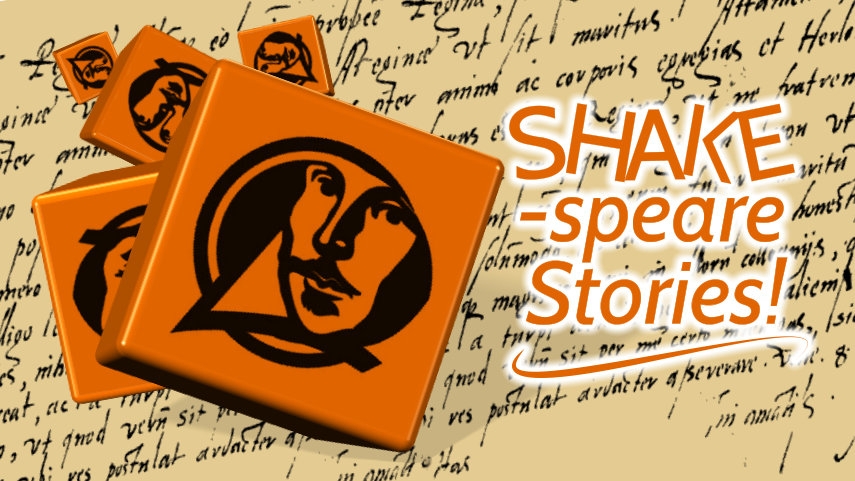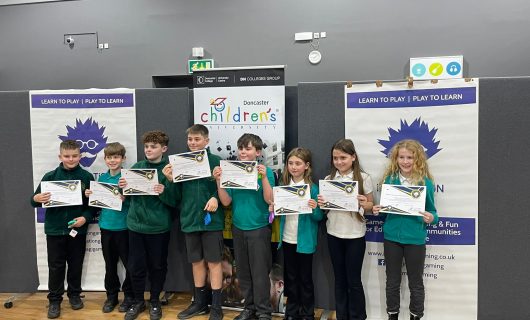
We have a fantastic new activity and competition, designed specifically to support upcoming Shakespeare Week and creatively engage young readers. ‘SHAKEspeare Stories’ gives players an opportunity to choose a creatively abridged plot-line from one of his famous tales of their choice, and recreate the story with characters and a setting randomly generated by ‘shaking the story’, with a new range of the worldwide phenomenon that is Rory’s Story Cubes.
‘SHAKEspeare Stories’ with Imagination Gaming
Before Christmas we were approached by Sheffield Libraries to see if we had any activities to help support and promote Shakespeare Week 2016. We replied with a resounding – ‘ERM?!…’ !
I must confess this was a new one on me, even with everything we have done in schools for years and a son of school age myself, it was something I hadn’t come across before, but it’s a big thing. Shakespeare Week is a national, annual celebration that aims to give primary school children a fun, engaging and inspirational first encounter with the man and his work. Thousands of schools, families and organisations took part last year and the number contnues to grow.
In 2016 it’s the 400 year celebration!
Back to the conversation with Sheffield Libraries – I think it went, ‘Sure, no problem, give us a couple of days… we’ll get back to you ASAP!’ If you know us, you’ll know we love a challenge, usually us giving them to you. We do pride ourselves on coming up with fresh ideas though, and this was, well, an opportunity shall we say.
It’s relatively easy to come up with ideas that contain the relevant content, but making it appealing, accesible and understandable to the your audience, that’s the crucial bit. If an activity doesn’t hit those 3 markers you’re going to struggle. The biggest perceived barrier between Shakespeare and todays generations is undoubtedly the language. As I recall there’s plenty of mirth and festivities and not an awful lot of L.O.L and smiley face icons!
So we came up with ‘SHAKEspeare Stories’
Regardless of the language used, the stories of Shakespeare are rich in plot and timeless. We simply needed to be able to get these across simply so that newcomers to Shakespeare could quickly appreciate them and realise they were still relevant in todays world, and then inspire them with an opportunity to get creative with Shakespeare as the starting point.
So we went back to an old favourite, the mighty Rory’s Story Cubes and our previous story challenges. These simple story cubes have taken the world by storm in recent years and are great for developing communication and creativity from a young age. We use them regularly in our literacy games days and workshops in schools and libraries nationwide to great effect.
With ‘SHAKEspeare Stories’ we have found a fun way of introducing Shakespeare and getting players to write their own stories based on a similar theme. We provide participants with a menu of extremely abridged versions of his more famous works, just 2 or 3 sentences that get the essence of the story across and no more. This enables players to quickly recognise the basis of each story and from that they can decide the basic arc of their tale. They can then ‘SHAKE’ the story cubes and introduce random elements to their story, knitting them together however their imagination sees fit.
For example!
Imagine taking the plot-line Romeo and Juliet: A young couple fall in love, their friends and family try to keep them apart but they continue to meet whenever and wherever they can. They manage to escape together but there is a sad ending when something unfortunate happens to both of them.
Players then write their own short version including the content on the dice they rolled, which include characters, animals, objects, emotions and settings. What if Romeo was a lonely tortoise and Juliet is a beautiful fish?!!… and the events and emotions and other characters on the dice they have been given would help form the rest of their very own story.
There are also sets of themed Story Cubes that would be authors can use to give their story a specific feel, such as mythic, enchanted, prehistoric… or even set in space!
What else?!
In addition, in larger projects, young Shakespearians will be invited to submit their short stories and have them exhibited on Imagination Gaming’s website and shared by the libraries, promoting their success and the event itself… and there will be prizes for the judges favourites too!
This is an excellent and easily accessible way for newcomers to Shakespeare, old and young alike, to get creative, have fun, and begin to appreciate the fantastic story-lines at the heart of his work and their timeless appeal… and dig a little deeper.
This will be available as part of Imagination Gaming’s popular games workshops, full of exciting card and board games with a cool twist for all ages.This offers a range of inspirational activities for children and families to participate in at a level to suit everyone.
If this or any of our other activities inspire you, contact us here and we’ll see how we can help you too!


